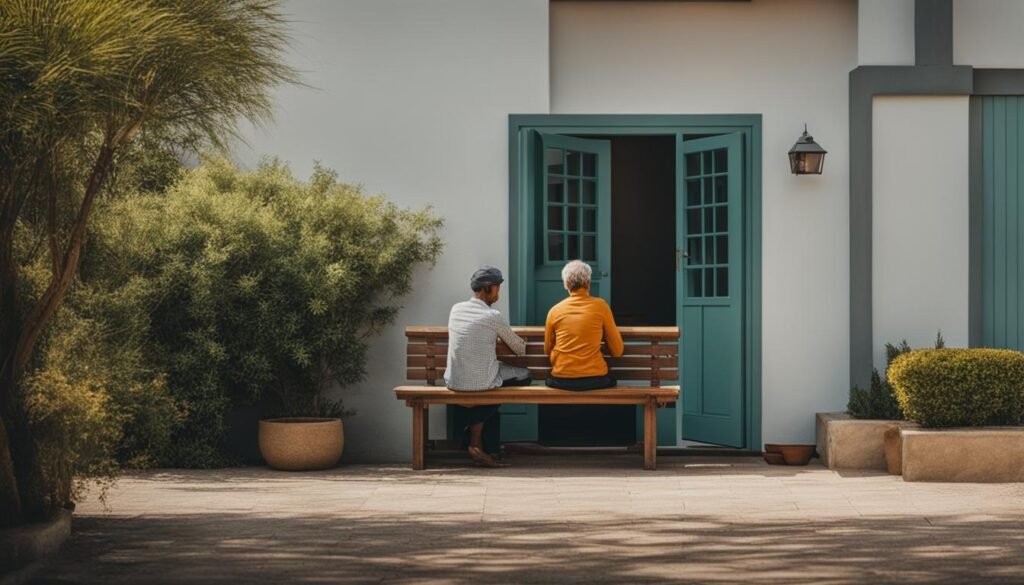Is it OK to just live a simple life?
Living in a fast-paced world often leads to stress and constant busyness. However, there is a growing desire to live a simpler life and prioritize what truly matters. Living a simple life doesn’t mean giving up everything and moving to a cave; it’s about finding what’s important to you and creating a pathway to have those things in your life. It’s about reducing stress, focusing on meaningful relationships, and finding balance between happiness, health, and success.
Key Takeaways:
- Living a simple life allows you to prioritize what truly matters to you.
- It’s about reducing stress and focusing on meaningful relationships.
- Simple living is not about giving up everything, but about finding balance.
- Living simply can lead to greater happiness, health, and success.
- Embracing a simple lifestyle can bring a deeper sense of fulfillment.
The Pressure to be Busy and Successful
In today’s fast-paced and interconnected world, there is an increasing pressure to be constantly busy and successful. We are bombarded with images on social media of people who seem to be living their best lives, achieving great things, and always on the move. This constant exposure to the achievements and activities of others can make us feel inadequate and push us to fill our days with an endless list of tasks, commitments, and social engagements.
The expectation to be busy has become a societal norm, leading many to believe that success can only be attained through a relentless pursuit of productivity and achievement. We are constantly reminded of the importance of climbing the ladder, accumulating wealth, and achieving recognition. This pressure to be constantly busy and successful can take a toll on our mental and physical well-being, leaving us feeling overwhelmed, burnt out, and disconnected from what truly matters.
It’s important to recognize that true success and fulfillment are not solely measured by external achievements or the number of items crossed off our to-do lists. Success should be defined on our own terms, taking into account our personal values, passions, and what brings us genuine joy and contentment. It’s about finding a balance between pursuing our goals and taking the time to nurture our well-being, relationships, and overall happiness.
Table: The Effects of the Pressure to be Busy
| Effects | Impact |
|---|---|
| Increased stress levels | Leads to burnout, anxiety, and decreased overall well-being |
| Reduced quality of life | Less time for leisure, hobbies, and self-care activities |
| Strained relationships | Lack of quality time and meaningful connections with loved ones |
| Decreased creativity and productivity | Constant busyness can limit mental space for innovation and focus |
“Success is not the key to happiness. Happiness is the key to success. If you love what you are doing, you will be successful.” – Albert Schweitzer
It is essential to challenge the societal pressure to be busy and successful and instead, prioritize our well-being, meaningful connections, and a sense of purpose. By redefining success on our own terms and embracing a simpler, more intentional life, we can find fulfillment and true happiness beyond the constant busyness of modern life.
What Does Simple Living Really Mean?
Simple living is a lifestyle choice that embraces the idea of prioritizing what truly matters and eliminating the unnecessary. It is not about giving up everything or adhering to extreme minimalism; rather, it is a personal journey of finding balance and creating a life that aligns with your values. The definition of simple living may vary from person to person, as it is about finding what brings you joy, contentment, and fulfillment.
“Simplicity is the ultimate sophistication.” – Leonardo da Vinci
At its core, simple living involves decluttering both your physical and mental space. It means letting go of material possessions and commitments that no longer serve you. By embracing self-sufficiency, you can focus on what truly brings value to your life and reduce dependency on external factors. Simple living also means finding joy in everyday moments and appreciating the present rather than constantly chasing after more.
Finding Balance in a Complex World
In today’s fast-paced and consumer-driven society, simple living is a conscious choice to slow down and simplify. It is a way to break free from the pressures of materialism, comparison, and the constant pursuit of success. By embracing simplicity, individuals can prioritize their well-being, relationships, and personal growth.
| Benefits of Simple Living | Definition of Simple Living |
|---|---|
| – Reduced stress and anxiety | – Focusing on what truly matters |
| – Increased happiness and contentment | – Eliminating the unnecessary |
| – Improved relationships and connections | – Embracing self-sufficiency |
| – Enhanced creativity and productivity | – Finding joy in everyday moments |
| – Better physical and mental health | – Letting go of materialism |
Simple living is a conscious choice to live a life that aligns with your values and priorities. It is a journey of self-discovery, finding what truly brings you joy and fulfillment. By embracing simplicity, you can create a more balanced, meaningful, and contented life.
The Benefits of Simple Living
Living a simple life can have a profound impact on our overall well-being. By embracing simplicity, we can unlock a multitude of benefits that enhance our happiness, health, and relationships.
Finding Happiness
One of the greatest benefits of living a simple life is the ability to find true happiness and contentment. When we prioritize what truly matters to us and let go of the need for excessive material possessions and constant busyness, we create space for joy and fulfillment. By focusing on meaningful experiences and relationships rather than material wealth, we cultivate a deep sense of gratitude and appreciation for the simple joys of life.
Improving Health
Simple living also positively impacts our physical and mental health. By reducing stress and eliminating unnecessary commitments, we create a healthier lifestyle. Stress is a prevalent issue in today’s society, and it can have detrimental effects on our well-being. Living a simple life allows us to manage stress more effectively, leading to improved overall health. Additionally, by prioritizing self-care and mindfulness, we can enhance our physical and mental well-being and experience a greater sense of well-being and vitality.
Strengthening Relationships
Another significant benefit of simple living is the opportunity to strengthen our relationships with others. By decluttering our schedules and eliminating distractions, we can devote more time and energy to nurturing meaningful connections. Simple living encourages us to prioritize quality time with loved ones and engage in deeper, more meaningful conversations. As a result, our relationships flourish, and we experience a greater sense of fulfillment and connection with those who matter most to us.
| Benefits of Simple Living | |
|---|---|
| Finding Happiness | Embracing simplicity allows us to find true happiness and contentment. |
| Improving Health | Living a simple life reduces stress and promotes better physical and mental well-being. |
| Strengthening Relationships | Simple living provides us with the opportunity to prioritize meaningful connections and deepen our relationships. |
By embracing a simpler lifestyle, we can unlock these incredible benefits and create a life filled with happiness, health, and strong relationships. Simple living is a powerful choice that allows us to focus on what truly matters and live a life characterized by joy, contentment, and genuine fulfillment.

Breaking Free from Materialism and Comparison
Living a simple life is not just about decluttering your physical space; it also involves breaking free from the chains of materialism and comparison. In today’s consumer-driven society, we are constantly bombarded with messages that tell us we need more to be happy and successful. We are made to believe that our worth is determined by the things we own and the lifestyles we portray on social media.
But simple living challenges these notions. It invites us to question the relentless pursuit of material possessions and the constant comparison with others. It encourages us to shift our focus from external validation to internal fulfillment. By embracing a simpler lifestyle, we can find contentment and joy in the things that truly matter.
“The things you own end up owning you.”
This quote from the movie Fight Club encapsulates the essence of materialism. When we attach our happiness and identity to our possessions, we become enslaved by them. We are constantly chasing the next big purchase, seeking validation from others, and comparing ourselves to those who seem to have more.
However, when we break free from materialism and comparison, we liberate ourselves. We realize that happiness and fulfillment come from within, not from the accumulation of things. We learn to appreciate the simple pleasures in life, cultivate gratitude for what we already have, and focus on experiences and relationships rather than possessions.
The Pitfalls of Consumerism
Consumerism is the driving force behind materialism and comparison. It is the constant desire for more, the belief that buying things will bring us happiness and fulfillment. However, consumerism often leads to debt, stress, and a never-ending cycle of dissatisfaction.
By embracing a simple life, we can break free from this cycle. We can resist the pressure to constantly acquire more and instead find contentment in what we already have. We can redirect our focus towards personal growth, meaningful experiences, and the pursuit of inner peace.
Investing in What Truly Matters
Living a simple life allows us to invest our time, energy, and resources in what truly matters. Instead of spending our days chasing after the latest trends and trying to keep up with others, we can prioritize our relationships, personal growth, and well-being.
By letting go of the need for material possessions and the constant comparison with others, we create space for more meaningful connections and experiences. We can focus on cultivating our passions, nurturing our mental and physical health, and making a positive impact on the world around us.
Table: The Effects of Materialism and the Benefits of Simple Living
| Materialism | Simple Living |
|---|---|
| Leads to constant comparison | Fosters contentment and gratitude |
| Causes financial stress and debt | Promotes financial freedom and security |
| Focuses on external validation | Emphasizes internal fulfillment |
| Leads to a never-ending pursuit of more | Prioritizes what truly matters |
Living a Slower Pace and Prioritizing Time
When it comes to living a simple life, one of the key aspects is adopting a slower pace and prioritizing time. In our fast-paced society, we often find ourselves rushing from one task to another, constantly caught up in the whirlwind of busyness. However, by slowing down and intentionally managing our time, we can create space for leisure, relaxation, and a more balanced lifestyle.
Slowing down doesn’t mean being unproductive or lazy; rather, it means being intentional and mindful about how we spend our time. It involves carving out periods of leisure and rest, allowing ourselves to recharge and rejuvenate. By doing so, we can experience a greater sense of well-being and find more joy in the simple pleasures of life.
“In today’s fast-paced world, it’s crucial to find moments of stillness and leisure. It’s in these moments that we can truly connect with ourselves and others.”
Time management plays a crucial role in this process. It requires us to evaluate our commitments and prioritize what truly matters. By eliminating unnecessary tasks and focusing on the activities that bring us joy and fulfillment, we can create a more balanced and meaningful life. This may involve saying no more often, setting boundaries, and being selective about how we allocate our time.
The Benefits of Slow Living
Embracing a slower pace of life and prioritizing time can have numerous benefits. It not only reduces stress and burnout but also allows us to be more present and engaged in the moment. By intentionally creating space for leisure and relaxation, we can boost our creativity, improve concentration, and enhance our overall well-being.
Additionally, adopting a slower pace can help us build stronger relationships. When we slow down and prioritize quality time with loved ones, we can deepen our connections and create lasting memories. It’s in these moments of leisure that we can truly engage with one another and foster meaningful relationships.
Ultimately, living a slower pace and prioritizing time is about finding balance and cultivating a lifestyle that aligns with our values. It’s about savoring the journey rather than rushing through life. By embracing slow living, we can create a more intentional, fulfilling, and joy-filled existence.

Table: Benefits of Slow Living
| Benefits | Description |
|---|---|
| Reduced stress | Slowing down can alleviate stress and promote overall well-being. |
| Improved relationships | By prioritizing quality time, we can deepen our connections with others. |
| Enhanced creativity | Taking time for leisure can boost our creativity and inspire new ideas. |
| Greater presence | Slowing down allows us to be more present and fully engage with the present moment. |
Creating Meaningful Connections
Living a simple life allows me to prioritize meaningful connections with the people in my life. By decluttering my schedule and reducing distractions, I can devote more time and energy to nurturing these relationships. It’s about quality over quantity, investing in deep and authentic connections rather than spreading myself thin with superficial interactions.
When I prioritize meaningful connections, I am able to have deeper conversations and truly be present in the moment. This allows me to fully engage with the people I care about and cultivate stronger bonds. In a world filled with constant distractions, it’s important to create space for genuine connections that bring joy and fulfillment.
The Importance of Quality Time
One way I prioritize meaningful connections is by setting aside dedicated time for the people I love. Whether it’s a weekly dinner with family, a regular coffee date with a close friend, or a romantic date night with my partner, carving out this quality time is essential. It’s a chance to connect on a deeper level, share experiences, and create lasting memories.
During these moments of quality time, I make a conscious effort to be fully present. I put away my phone, eliminate distractions, and give my undivided attention to the person in front of me. This not only shows them that they are valued and respected, but it also allows me to truly appreciate the experiences we share together.
“The greatest gift you can give someone is your time. It’s a precious commodity that can never be replaced.” – Unknown
By investing in meaningful connections, I am able to create a support system that enriches my life. These relationships bring joy, laughter, comfort, and a sense of belonging. They remind me of what truly matters and provide a source of strength during challenging times.
Table: Prioritizing Quality Connections
| Benefits of Meaningful Connections | How to Prioritize Quality Connections |
|---|---|
|
|
Investing in meaningful connections is a choice that requires effort, intention, and vulnerability. It’s about building relationships that go beyond surface-level interactions and nurturing the bonds that truly matter. By prioritizing quality connections, I am able to cultivate a sense of belonging, love, and support that enriches my life in immeasurable ways.

Embracing Health and Well-being
Living a simple life can have numerous health benefits, contributing to stress reduction and fostering mindfulness. By prioritizing what truly matters and eliminating unnecessary busyness, individuals can create a lifestyle that promotes overall well-being.
One of the significant advantages of simple living is the reduction of stress levels. In today’s fast-paced world, constant busyness and the pressure to keep up can take a toll on our mental and physical health. By slowing down and simplifying our lives, we can lower cortisol levels, the stress hormone, and create a more balanced and peaceful existence. Simple living allows us to focus on self-care, relaxation, and meaningful experiences, ultimately reducing the impact of stress on our bodies and minds.
Mindfulness is another key aspect of simple living. By embracing a simpler lifestyle, we cultivate an awareness of the present moment, appreciating the little joys and practicing gratitude for what we have. Slowing down allows us to savor each experience, whether it’s enjoying a home-cooked meal or spending quality time with loved ones. By being mindful and fully present, we enhance our overall well-being and find greater contentment in the simplicity of everyday life.

Living a simple life can have profound effects on our health and well-being. By reducing stress and embracing mindfulness, we create a space for greater happiness, improved sleep quality, and a healthier lifestyle. It’s about prioritizing our physical and mental well-being, allowing us to thrive in the midst of a busy world. By embracing a simpler lifestyle, we can experience the true benefits of health and well-being.
Finding Joy in Simplicity
Living a simple life allows me to discover and appreciate the true joy that comes from embracing the simplicity of everyday moments. It’s about finding contentment in the little things and cultivating a sense of gratitude for what I already have.
In today’s fast-paced world, it’s easy to get caught up in the pursuit of material possessions and external achievements. But when I take a step back and focus on what truly matters, I realize that true joy and fulfillment are not found in the accumulation of things, but in the moments of connection, peace, and gratitude.
By simplifying my life, I create the space and time to savor the present moment and fully immerse myself in the experiences that bring me happiness. Whether it’s a quiet morning with a cup of coffee and a good book, a walk in nature, or a heartfelt conversation with a loved one, these simple moments are where true joy resides.
Embracing Gratitude
“Gratitude unlocks the fullness of life. It turns what we have into enough, and more. It turns denial into acceptance, chaos into order, confusion into clarity. It can turn a meal into a feast, a house into a home, a stranger into a friend.” – Melody Beattie
Gratitude plays a crucial role in finding joy in simplicity. When I shift my focus from what I don’t have to what I do have, I am reminded of the abundance and blessings that surround me. It’s about appreciating the beauty of the present moment and cultivating a deep sense of gratitude for the simplest of things.
Through a practice of gratitude, I have found that my perspective shifts, allowing me to see the world through a lens of abundance rather than scarcity. This shift in mindset brings me a sense of contentment and fulfillment, as I no longer feel the need to constantly chase after more. Instead, I find joy in the richness of what I already possess.
Finding Contentment in the Present
In the midst of our busy lives, it’s easy to get caught up in thoughts of the past or worries about the future. But living simply teaches me the importance of being fully present in the here and now. It’s about appreciating the beauty of the present moment and finding contentment with what is.
When I let go of expectations and embrace the present moment, I find that joy naturally arises. Whether it’s witnessing a breathtaking sunset, sharing a hearty laugh with friends, or simply enjoying a quiet moment of solitude, these moments of presence are where I find true contentment.
Living a simple life has taught me that joy is not found in the pursuit of external achievements or material possessions. It is found in the simplicity of everyday moments, in the practice of gratitude, and in the ability to fully embrace the present. By prioritizing what truly matters and letting go of the unnecessary, I have discovered a deeper sense of joy, contentment, and fulfillment in my life.
Conclusion
After exploring the concept of living a simple life, it becomes clear that this lifestyle choice can have profound positive impacts on our overall well-being. By prioritizing what truly matters, reducing stress, and enhancing relationships, we can experience a greater sense of contentment and fulfillment.
Embracing simplicity is not about giving up everything or living in extreme minimalism. It’s about finding balance and focusing on the essentials in life. By eliminating the unnecessary and embracing mindful choices, we can create a pathway to a happier and more fulfilling life.
So, is it okay to just live a simple life? Absolutely. It’s a personal journey that allows us to redefine success, find joy in the everyday, and cultivate a deeper sense of gratitude. Living simply is a path worth exploring for anyone seeking greater happiness and meaning.
FAQ
Is simple living about giving up everything and living in extreme minimalism?
No, simple living is a personal journey that allows you to prioritize what’s important to you and eliminate the unnecessary.
What are the benefits of living a simple life?
Living a simple life can lead to greater happiness, reduced stress, improved relationships, increased creativity, and better overall well-being.
How can simple living improve relationships?
By decluttering your schedule and reducing distractions, you can devote more time and energy to nurturing relationships, leading to stronger bonds and deeper connections.
How does simple living impact health and well-being?
Simple living reduces stress, improves sleep quality, encourages mindful eating and self-care, and allows for a focus on holistic health, resulting in a happier and healthier life.
Does simple living mean giving up material possessions?
Simple living encourages you to shift your focus from acquiring more material possessions to finding joy in meaningful experiences and relationships.
How does simple living help in finding joy?
By appreciating the little moments, practicing gratitude, and living in the present, simple living allows you to experience a deeper sense of contentment and fulfillment.
How can I start living a simple life?
Start by prioritizing what truly matters to you, decluttering your physical and mental space, and embracing a slower pace of life that allows for greater focus and enjoyment of the present moment.
Will living a simple life make me less successful?
No, success is subjective, and living a simple life allows you to define your own version of success based on what brings you true happiness and fulfillment.
Can I still enjoy leisure activities while living a simple life?
Absolutely! Simple living is about finding balance and prioritizing what brings you joy, so leisure activities that align with your values and happiness are an important part of a simple life.
Is it possible to live a simple life in a fast-paced world?
Yes, living a simple life is a personal choice that can be practiced regardless of the external circumstances. It’s about finding what’s important to you and creating a pathway to have those things in your life.






